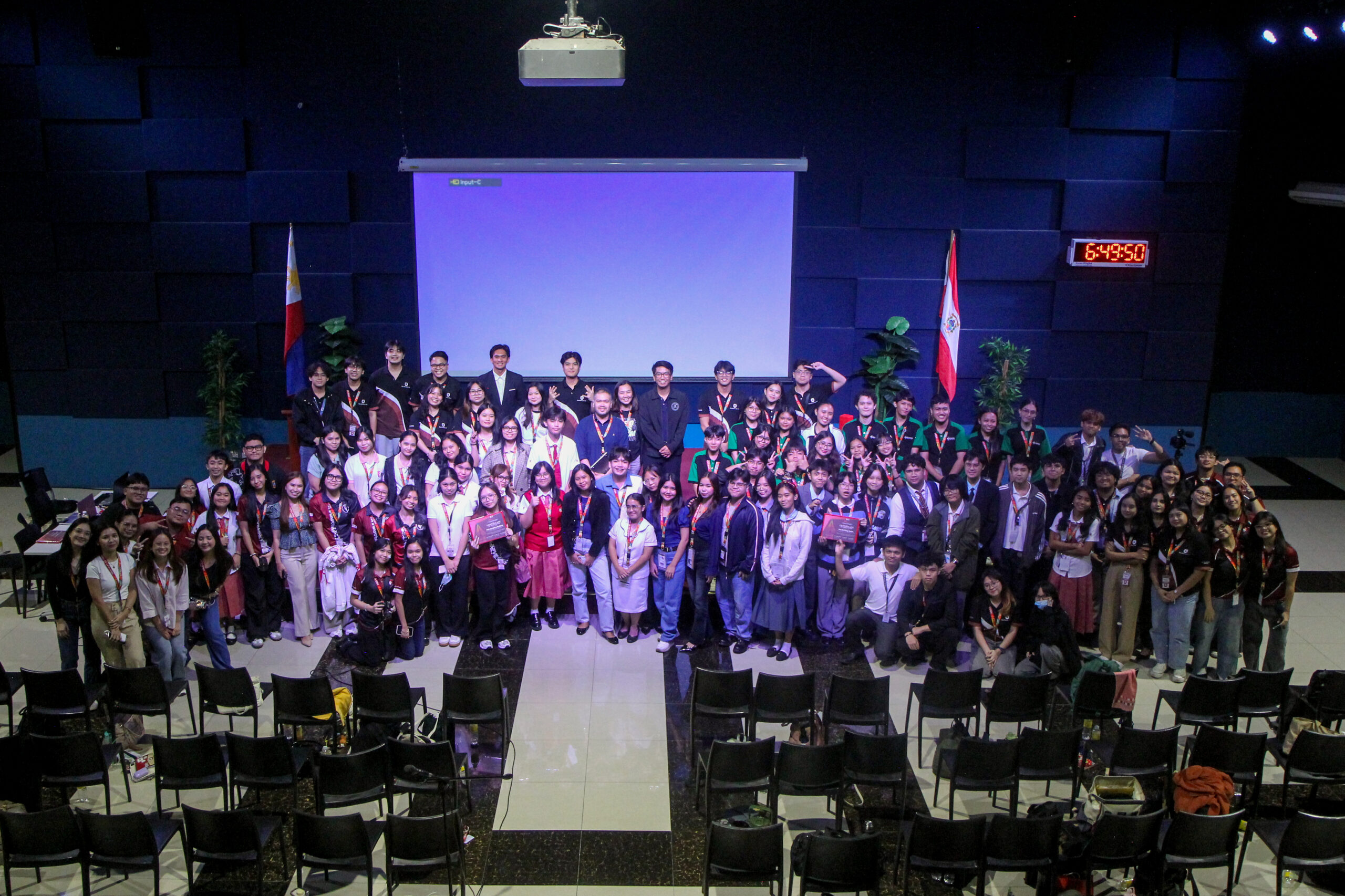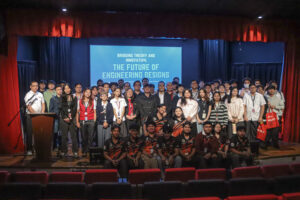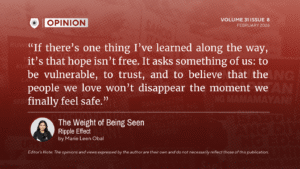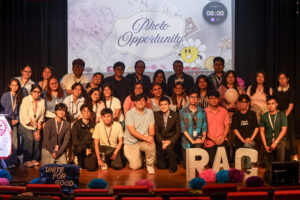Written By Luis Gabriel R. Santiago | November 11, 2025
Continuing the fight for transparency and accountability in TBH’s [M]ulat 2025
WITH calls for government transparency at their highest in recent times, THE BEDAN HERALD’s third annual inter-school forum, [M]ulat: Mag-ulat at Magmulat, centered on the ever-important role of campus journalists as catalysts for accountability in light of numerous controversies surrounding the government, such as the flood control projects and anomalous government contracts under the Department of Public Works and Highways (DPWH).
Held last Nov. 7 at the Manny Reyes Hall, participants of the forum included student publications from various universities, extra-curricular, and co-curricular organization partners. Joining the event were media partners The Shifting Gears, Bedan Chronicle, and Pahayagang Bedista, along with network partners One 4 All, All 2N, the Bedan Electoral Committee, Bedan Entrepreneur Society, Bedan Psychological Society, Beda.Comm, Junior Philippine Management Association, Junior Bedan Law Circle, and San Beda Rovers Circle—organizations whose continued partnership helped amplify the forum’s reach.
The publication’s adviser, Prof. Vanessa Ignacio, addressed the participants of the forum in her welcoming remarks, stating that campus journalists are the closest to the issues that trouble the student body: tuition fees, mental health support, academic integrity, and misuse of student funds, among others. She notes that campus journalists are the ones who have the platform to shed light on these issues, making them visible, verifiable, and actionable.
“Even within the walls of our campuses, journalism remains a powerful force for truth and accountability. As campus journalists, we are not just student writers, we are truth seekers, storytellers, and catalysts for change,” said Juan Miguel Diaz (IV-BSLM), TBH Editor-in-Chief, during his opening remarks.
He mentioned how student journalists take to their pens when others opt to stay out of the noise, and how they dare to ask the difficult questions when others choose to turn away. “When the youth are aware, when the press are vigilant, and when the truth is known, no power, no system, and no corruption can stand unchallenged,” Diaz concluded.
The forum’s first speaker, Felipe F. Salvosa II, adviser of The Varsitarian and the Department of Journalism Chair at the University of Santo Tomas, took to the stage to discuss how campus journalism can be a tool for public accountability.
For nearly a century, he described the campus paper, The Varsitarian, as the conscience of the Thomasian community. Despite Martial Law silencing and restricting the voice of the press, he said that campus journalists kept the flame of truth alive through newsletters and underground presses. He noted that while threats to truth continue to persist, albeit in a different form, journalists continue to face intimidation, condemn corruption, and demand accountability.
Campus journalists are “on the ground,” having witnessed the social issues that the country suffers from firsthand, with Salvosa describing them as the voice of the perspectives left ignored by many. “I think it's another value of campus journalism; it stays closer to its community. It stays closer to the people who are affected. They live in the stories that they cover,” he added.
Previously a researcher and training officer for the Philippine Center of Investigative Journalism, Martha Teodoro describes Investigative Journalism as “telling what they don’t want you to know.”
She explains that there is a process to finding their stories, starting with being critical of what they see in the media, being aware of the developments in their environment, listening to the grievances of their community, and the like. Teodoro puts forward the idea that investigative journalism is a “document state of mind,” an assumption that there will always be documents and data to back up or refute a statement made by a public figure.
The speaker emphasized the importance of resonating with a story; while it may be easy to find an angle to a story, having the passion and belief in your piece is equally important. “If a story doesn’t fascinate you, outrage you, or give you the intense desire to see something to change, give it to someone else. Kailangan naniniwala ka sa sinusulat mo,” she said.
“That’s the hard part of journalism, you are not alone. You are not a cartoon character with no relatives; you are a real person with real loved ones,” said JC Gotinga, senior producer and reporter for Rappler, as he touched on the ethics that come with journalism. He explained that being brave isn't enough, that journalism comes with real-life consequences that not only may affect the individual but also put their family at risk.
In an ideal world, Gotinga describes that journalism is simply record-keeping, turning the unknown into the known; however, investigative journalism exists because people in power wish to conceal and keep information hidden from the public.
Citing examples such as seasoned Filipino journalist Jessica Soho’s di umano, Gotinga stressed the fine line between presumption and having actual evidence, “Only say what you have evidence of.” He noted the importance of proper attribution, how sources shouldn’t be named to protect their safety, and how citing public officials contributes to the strength of your statement.
As the last speaker of the forum, Rappler Multimedia Reporter Jairo Bolledo mentioned how silence meant being complicit in the corruption itself. While he states that journalism, in paper, is a noble profession, journalists are treated as charlatans and face the ugly realities of intimidation and harassment for being in service to the truth.
“Corruption kills” is a sentiment that Bolledo echoes, stating that it is their duty to hold them accountable as per the concept of the Fourth Estate. While a single report will not change the deep-seated systemic corruption, the ripple effect of consistent truth-telling will eventually produce results.
He adds that Rappler’s continued coverage of certain social issues has become a catalyst for accountability that has led to tangible change, such as the ICC's conviction of former president Rodrigo Duterte during his administration’s war on drugs and human rights abuses.
In addition, Bolledo highlights the importance of campus journalists and how their work fills the gaps of mainstream media and news websites, explaining that their coverage extends to the communities adjacent to their campuses.
Capping off the forum, Isabel Daenah Manzanero (IV-BSLM), [M]ulat project head and TBH Associate Editor, expressed her appreciation to speakers, partners, and attendees alike. She hoped that the current issues surrounding the government would not remain as forum topics but become fuel for campus journalists in their fight for truth, transparency, and accountability.
“As we continue to live in an era that does not stop progressing and advancing, we must not only hold the public officers accountable but even ourselves, in what we release and whose voices we choose to amplify,” she concluded.
Volume 31 | Issue 5




